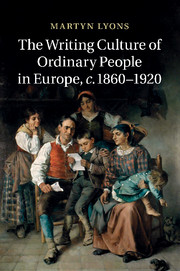Book contents
- Frontmatter
- Contents
- Illustrations
- Maps
- Acknowledgements
- Note on translations and transcriptions
- 1 Ordinary writings, extraordinary authors
- 2 Archives for an alternative history
- 3 ‘Excuse my bad writing’
- 4 Literary temptations
- 5 France
- 6 France
- 7 Family, village and motherland in the writing of Italian soldiers, 1915–1918
- 8 Italian identities ‘from below’ and ordinary writings from the Trentino
- 9 Love, death and writing on the Italian front, 1915–1918
- 10 Spain
- 11 Family strategy and individual identities in the letters of Spanish emigrants
- 12 Order and disorder in the ‘memory books’
- 13 Conclusions
- Bibliography
- Index
- References
9 - Love, death and writing on the Italian front, 1915–1918
Published online by Cambridge University Press: 05 November 2012
- Frontmatter
- Contents
- Illustrations
- Maps
- Acknowledgements
- Note on translations and transcriptions
- 1 Ordinary writings, extraordinary authors
- 2 Archives for an alternative history
- 3 ‘Excuse my bad writing’
- 4 Literary temptations
- 5 France
- 6 France
- 7 Family, village and motherland in the writing of Italian soldiers, 1915–1918
- 8 Italian identities ‘from below’ and ordinary writings from the Trentino
- 9 Love, death and writing on the Italian front, 1915–1918
- 10 Spain
- 11 Family strategy and individual identities in the letters of Spanish emigrants
- 12 Order and disorder in the ‘memory books’
- 13 Conclusions
- Bibliography
- Index
- References
Summary
Preserving one’s humanity
Guerrino Botteri never wrote about the war to his wife Selma. Their letters were devoted to love and desire. Instead, he confided his war experience to her brother and his own war diary. Guerrino was in his early thirties, and had married Selma in May 1914. His father had been an itinerant seller of salumi (cured meat) in Trieste, but Guerrino had succeeded in becoming an elementary schoolteacher in the Trentino. His sympathies lay with Italy, but he was called up on the Austrian side and was wounded at Gorizia. He looked back in his diary on the dehumanisation of the war. ‘Modern war’, he wrote,
has this frighteningly sad quality: individuality disappears, you become drops in a stream of lava which slowly, in its fatal motion, flows forward, stops, recedes.
The loss of individual identity, and the sense of being deprived of one’s essential human dignity were common experiences in the armies of the First World War. The continual proximity of rotten corpses – mutilated, abandoned and unidentifiable – could bring about a kind of emotional dissociation from the everyday horrors of war. Some soldiers survived emotionally by growing a very thick skin. Others described what was happening distantly as though they were watching a movie, detached from reality. In this context, communicating with a wife or lover reunited the individual soldier with his estranged self. In the midst of carnage, writing love-letters kept a man sane and in touch again with his sense of humanity.
- Type
- Chapter
- Information
- The Writing Culture of Ordinary People in Europe, c.1860–1920 , pp. 154 - 169Publisher: Cambridge University PressPrint publication year: 2012



